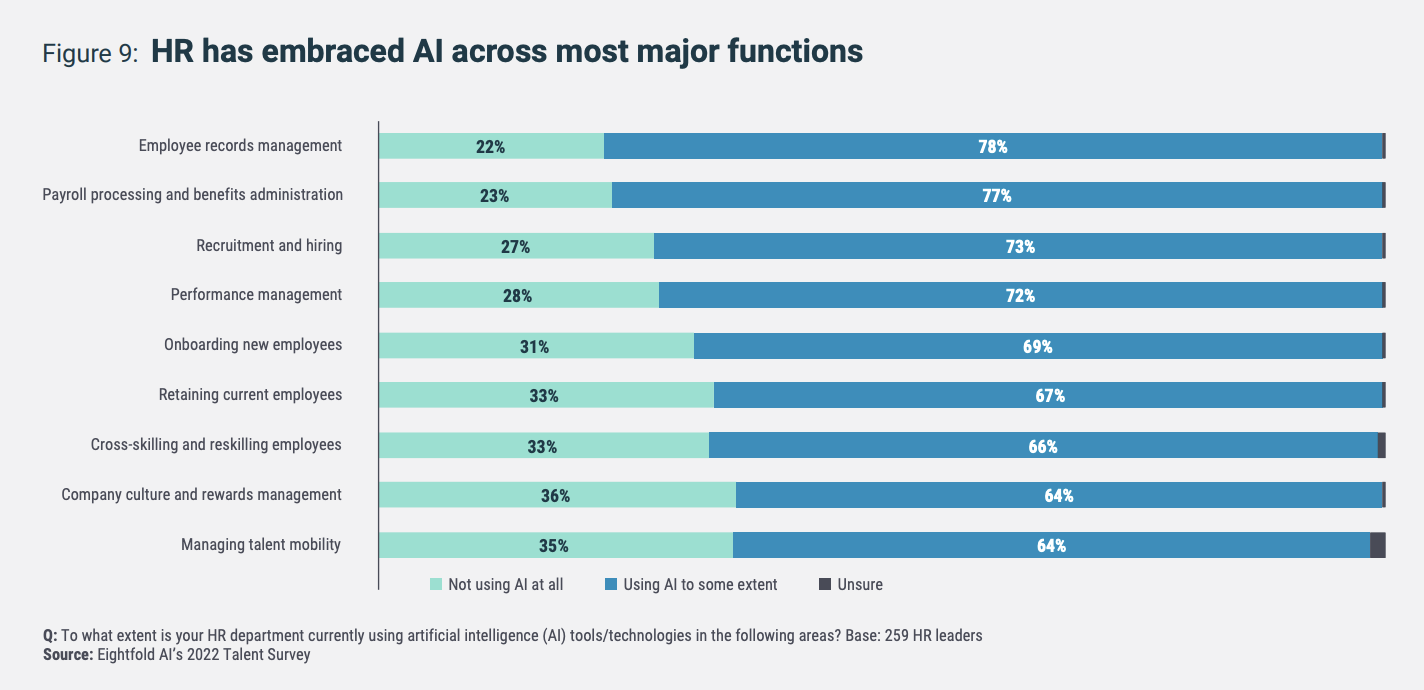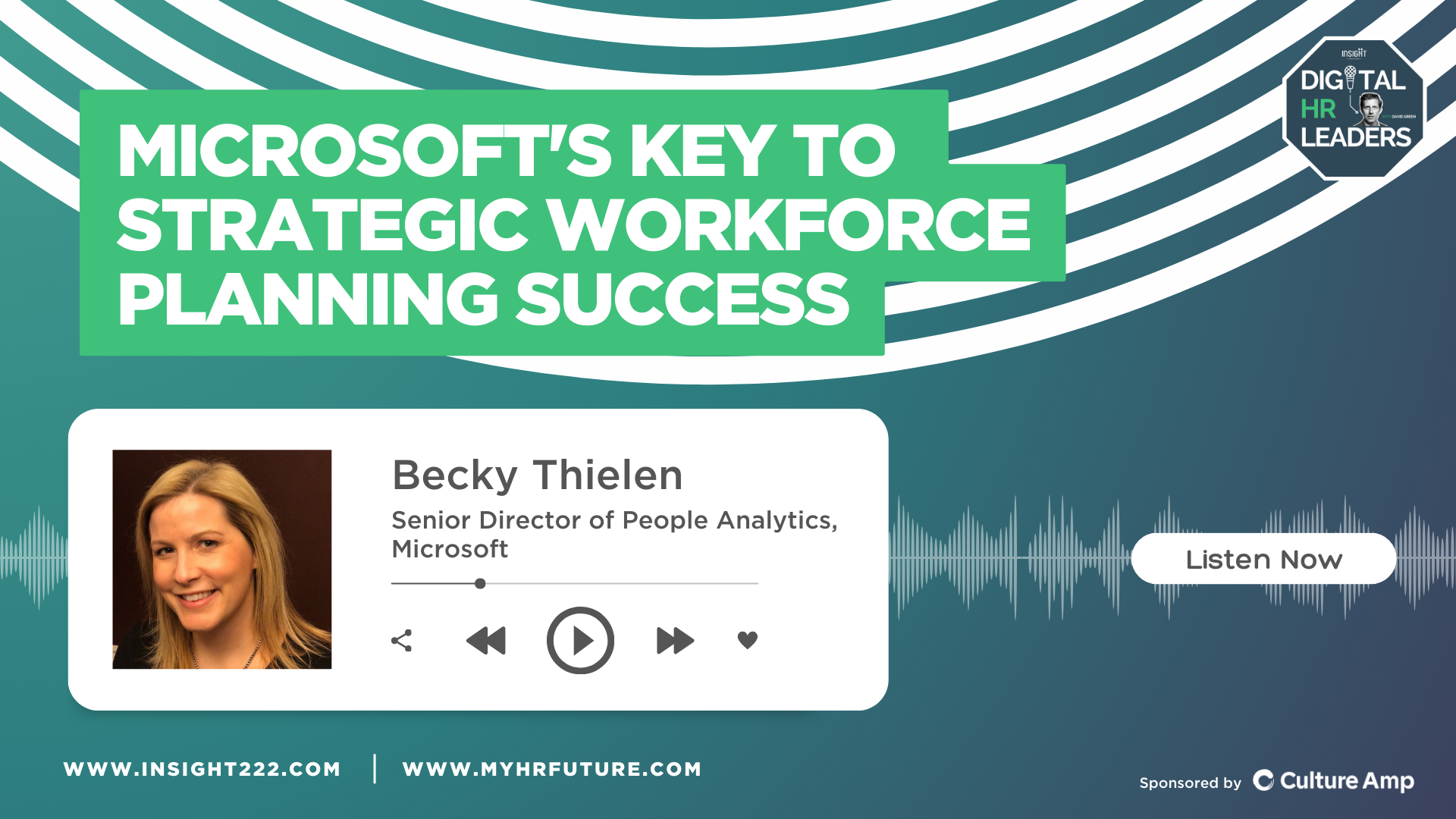Using AI to Transform your HR Strategies
New technologies are playing an increasingly important role in shaping the way organisations operate. We are seeing sales teams using AI-powered tools to improve their lead generation and customer acquisition processes, while marketing teams are leveraging data analytics and automation to optimise their campaigns and create more personalised consumer experiences.
According to a recent study, 78% of HR leaders report integrating AI into at least one function of their HR duties. This integration is primarily driven by HR departments' need to optimise operations amidst mounting pressures to deliver more with fewer resources.
Crucial HR processes such as payroll, benefits, and onboarding are expected to have a high degree of accuracy, and employees increasingly expect a consumer-grade experience that mirrors the personalisation they enjoy as customers.
And with ongoing talks over the imperative of HR to evolve into a more insightful and strategic business partner, there has never been a more fitting time to implement AI into your HR strategies.
So, how exactly can AI transform HR strategies and help drive better business outcomes?
IBM's Strategic Application of AI in HR
A prime example of AI's transformative power in HR can be observed at IBM. During a conversation with David Green on the Digital HR Leaders Podcast, Nickle LaMaroux, Chief Human Resources Officer (CHRO) at IBM, shared insights into how IBM is leveraging AI to transform its HR strategies. IBM's approach focuses on three key areas:
1. Recommendations: To offer personalised experiences to both employees and managers, including learning pathways and budget allocations. This targeted approach helps align developmental resources with individual needs and organisational goals, enhancing both growth and operational efficiency.
2. Call Assistants: To analyse vast datasets and deliver required information in seconds. These AI-powered chatbots assist HR by answering common employee queries about policies, liberating HR professionals from routine tasks and allowing them to focus on more strategic responsibilities.
3. Call Agents: These are digital assistants who work alongside HR professionals, streamlining complex processes like promotions and performance management.
Augmenting Performance Management Processes
A standout example of how IBM is using AI as a call agent is their innovative AI tool, HiRo, which they have used to help augment the promotion process—a process which I'm sure all readers would love to augment.
As you will be well aware, traditionally, the promotion process involves cumbersome data collection from multiple systems, manual coordination, and error-laden spreadsheets. IBM's HiRo significantly transformed this process by automating data collection, providing real-time insights, and streamlining communication through a single platform.
During her podcast interview with David Green, Nickle explains how HiRo is put into action.
"An HR professional will decide what the business leader is this year, here are the criteria... HiRo will read that document, ingest that document. HiRo will then go out to our HR systems, as disparate as they may be, pull together all of the information automatically, then send lists to 10,000 different managers, customised in email saying, "Nickle, promotion cycle's kicking off, here's the criteria, here's who's eligible in your organisation.
The manager can then go back and say, "I'd like to nominate these two people, this person's performance isn't where I'd expect it to be". HiRo ingests all of that. HiRo then, based on criteria we've given it, will make compensation recommendations that the managers can accept or adjust, and then send it directly to payroll."
By introducing this to the HR strategy, this allowed for less errors, improved promotion experiences, and enabled HR to be more consultative towards managers on how to approach promotion conversations.
Skills Taxonomy and Talent Management
Another significant application of AI at IBM is managing the skills taxonomy—an ever-evolving database crucial for workforce planning. With employees constantly working on new projects and completing new courses, they found that their skills taxonomy was constantly out of date.
To resolve this issue, they incorporated AI to automatically contact employees and their subsequent managers once an employee had completed a project or course or deployed to a different client to ensure the relevancy and accuracy of the organisation's current skills.
To further enhance the employee experience, they then used this information to create customised roadmaps for each employee. As Nickle explains:
"It will take my profile, bump it up against the profile I want to become, and it might say for David, it will take you 10 hours to become a blockchain developer, and Nickle, it might take you 10,000, and here are the different things that you need to do to get there. And those real-time learning roadmaps that were customised to the individual, it does a couple things for you.
You get to reskill people faster because it's really giving you just what you need to know; it's creating better engagement with the employees who want to take the learning because they're not repeating something or something that's already foundational to them; it's allowing to get us talent to the right place at the right time."
For a more in-depth exploration of IBM's use of AI in HR, we highly recommend listening to the episode on 'How IBM Uses AI to Transform Their HR Strategies'.
However, IBM is not the only one leading the way with AI adoption. For instance, Genpact is using AI to personalise employee engagement surveys based on individual career lifecycles and previous responses. Additionally, Microsoft is using AI to forecast future demand for skills and upstream its strategic workforce planning. With the help of AI, these organisations are creating a more data-driven and agile approach to HR management.
Integrating Virtual Reality into HR Practices
Beyond AI, companies are also exploring Virtual Reality (VR) and gamification to bolster their talent management strategies. On the Digital HR Leaders podcast, Bernard Marr, a world-leading think tank, highlights various organisations employing VR HR applications.
Marriott Hotels: Developed games that simulate hotel management, identifying potential job candidates based on game performance.
Accenture: Created the 'Nth floor,' a VR world for onboarding new hires, offering a comprehensive virtual experience of the company's environment.
London Underground: Uses VR to train engineers, providing a safe, simulated environment to practice before real-life application.
These are just some examples of how VR is being used in HR practices. From immersive training experiences to virtual job interviews and recruitment fairs, VR has the potential to revolutionise traditional HR practices.
Data-Driven HR in the Age of AI
Ultimately, with AI on HR's side, they can make more data-driven decisions that impact organisations positively. Using machine learning algorithms, HR teams can access invaluable support with various tasks:
Recruiting: Predictive analytics can assess the likelihood of an applicant accepting a job offer.
Retention: Analyse employee data to predict flight risks, thus providing opportunities for preventive measures.
Workforce Planning: Identify skills gaps in the workforce and plan recruitment, training, or reskilling initiatives accordingly.
Performance Management: Use data to identify top performers and create development plans for them.
Employee sentiment: Use natural language processing to analyse employee feedback and provide meaningful insights.
The possibilities are endless. With AI, HR can move beyond traditional approaches and embrace data-driven strategies that will profoundly impact its ability to become proactive, strategic partners within the business.
As HR evolves and adapts, the use of AI will only grow, creating a more efficient, engaging, and agile approach to talent management.
It's clear that AI is here to stay, and HR professionals must embrace its potential to continue driving success for their organisations. So, the question remains: are you ready to integrate AI into your HR practices?
Only time will tell, but one thing is for sure—those who embrace it will have a competitive advantage in attracting, developing, and retaining top talent in the age of AI.
Unlock the potential of your people analytics function with our Insight222 People Analytics Program®
Network with peers. Grow your influence. Solve business problems. Learn from industry leaders.
The Insight222 People Analytics Program® is your gateway to a world of knowledge, networking, and growth. Elevate your network and insights with the Insight222 People Analytics Program®. Become part of an elite circle of 100+ global clients driving people analytics forward. Engage in over 40 unique events yearly, from in-person meetings to virtual forums and webinars. Benefit from a program that evolves with your feedback, designed to tackle real-world challenges and ignite innovation in people analytics.
Discover how joining the Insight222 People Analytics Program® can help you deliver real business value to your organisation.





